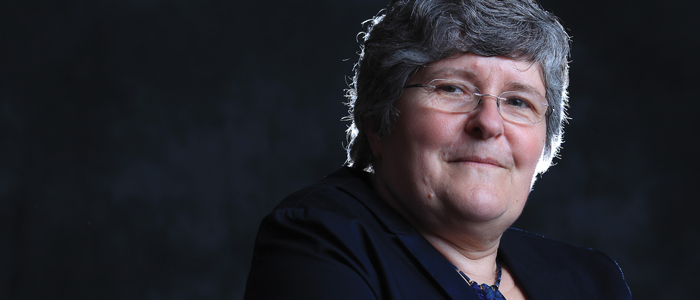Sabine Nolke LLB'85 stands “en garde” as Canada’s Ambassador to The Netherlands
October 12, 2016

The games Sabine Nolke plays require a similar mentality – respect for your opponent.
“I have brought a respect for the person on the other side of the ‘piste’ to the game of diplomacy. That has been very useful for me,” explained Nolke, a former world-class fencer and current Ambassador to The Netherlands from Canada.
“In fencing, you are out there figuratively trying to kill each other. And then, when you are done, you shake hands and go have a beer. Diplomats are like that, too. We argue with each other on behalf of our respective countries that sometimes may be on opposite sides politically. And then, when we are done with our meetings, we go have a beer.”
For the last 30 years, the lessons learned from sport have given the German-born Nolke, BA’78, MA’80, LLB’85, a perspective which has served her well in her long and impressive career with Foreign Affairs.
At Western, Nolke enjoyed the rigours of her legal education, particularly Corporate Law professor Bruce Welling’s classes which she described as “always fun and intellectually challenging.” There, she learned to see both – or all – sides of a story.
“In multilateral diplomacy, you have to see 193 perspectives. That is a skill I brought out of law school,” she said.
She worked at Western’s legal clinic in third year and enjoyed the hands-on experience of being in a courtroom. “I’m a doer, not a sit-in-the-class listener,” she said.
But it was on the piste – that 14-metre-long, 2-metre-wide playing surface for fencing – where she discovered a sport that sharpened her mind and developed her formidable negotiating skills.
Nolke was a member of the 1979 and 1980 the Ontario Women’s Interuniversity Athletic Association (OWIAA) foil championship teams. In 1987, she was Eastern Canada champion and came in third at the Canadian Nationals. From 1987-92, she competed in numerous World Cups, until an injury forced her to retire.
She continued her involvement as an internationally licensed referee until 1996 when she says her law career got the better of her.
“Fencing is highly tactical and technical sport requiring a lot of patience and skill. You have to develop a lot or practice before you can start winning matches,” she explained. “It requires patience and an elaborate skill set. Diplomacy is like that as well. You have to learn how to read people.
“You have to have a certain amount of trust with your opponents who are the diplomats. You can make your point much more effectively, and you also can negotiate much more substantively, when they know you can be trusted. The competitiveness of fencing has helped has helped me as a negotiator.”
After graduation, Nolke worked in a law firm though quickly became disillusioned with private practice. She sought out other options. When her husband, fellow Mustang fencer Christopher Ram, secured a job with the Department of Justice, she moved with him to Ottawa, wrote the Foreign Service exam and was offered a position in the legal bureau of Foreign Affairs.
She quickly “fell in love with international law” and has pursued that career path ever since.
Nolke has held a series of positions, including Director-General of the Non-Proliferation and Security Threat Reduction Bureau. She is currently a Permanent Representative to the Organization for the Prohibition of Chemical Weapons (OPCW) and represents Canada’s interests before the international courts and legal institutions based in The Hague.
She got in on the ground floor of the development of the international criminal tribunals, working at foreign affairs in 1992 at the time of the Bosnian and Rwandan genocides. She drafted submissions for the criminal tribunal for Yugoslavian – the first criminal tribunal since Nuremburg – on its rules of evidence and procedure. A number of those rules made it into the tribunal – and subsequently led to convictions in the tribunal for Rwanda.
From 1999-2004, Nolke was co-counsel in Legality of Use of Force (Serbia and Montenegro v. Canada) before the International Court of Justice (ICJ).
“Being before the ICJ is the ‘Holy Grail of international law’ and was pretty exciting,” said Nolke, a recipient of a Minister of Foreign Affairs Award for Foreign Policy Excellence.
In her role with the OPCW, she works on a wide range of critical issues, including ensuring chemical weapons do not fall in the hands of non-state actors, such as ISIS; preventing use in conflicts, such as Syria; ensuring bio-security; and working with developing states on enhancing their obligations to destroy their chemical weapons arsenal.
As ambassador, she says it’s important to present a positive image of Canada, but admits in the Netherlands, that goal is not hard to accomplish. “People genuinely have a love for Canada in the Netherlands. If you say ‘Canada’ the rose petals and the red carpet come out because Canada is still remember for liberating the country,” she said.
It does, however, present a unique opportunity to take the relationship forward and “not just rely on past glories but build on that goodwill.”
Nolke says Canada and the Netherlands integrate extremely well in terms of technology, innovation, business, educational exchanges and sustainable energy.
“Our challenge is to capitalize on all that we have in common in new and exciting ways,” she said. “And that challenge is a huge opportunity and a privilege for me.”






